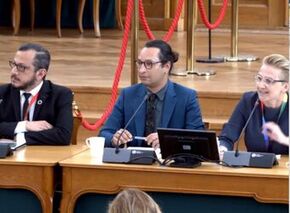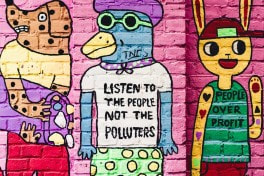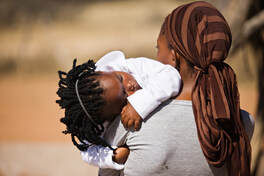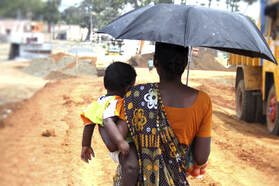UNAIDS’ recent report finds that worldwide goals for 2020 have not been reached, despite past years’ efforts. More people know their HIV-status, more people have access to medicines and more people have an undetectable viral load thanks to treatment. Yet, the efforts to prevent new infections have been less successful. The number of new infections among adults has hardly dropped in the past 4 years. Not a single region reached the goal to decrease new infections by 75% compared to 2016.
 LGBTI-persons and particularly young people ran increased risks of verbal and physcial violence during the lockdowns, and many struggled with depressions and thoughts of suicide. Especially those who could not ‘out’ themselves at home endured very challenging times. Being disconnected from their peers pushed young LGBTI-persons even more into social isolation, says senator, member of the Parliamentary Assembly of the Council of Europe and chair of the ‘Parliamentarians for the 2030 Agenda’, Fourat Ben Chikha, at the Human rights conference held in Copenhagen during the World Pride late August. The impact of the measurements on the human rights of LGBTI-persons needs close monitoring, so he said, to allow the adoption of necessary (preventive) actions to guarantee their rights. Over 100 parliamentarians from all over the world had gathered in Copenhagen to discuss the contemporary challenges for LGBTI-persons. Also, MP Goedele Liekens and Flemish MP and senator Orry Van de Wauwer, both members of the ‘Parliamentarians for the 2030 Agenda’ were present. Former member and current Vice-Prime Minister Petra De Sutter represented the Belgian government at the World Pride. The CPD follows up the implementation of the ICPD Programme of Action (Cairo PoA). The 2021 Theme was Population, food security, nutrition and sustainable development. After years of non-agreement, having an agreed outcome was a must. Following constructive discussions in the informals and excellent facilitation by the Bureau, agreed conclusions were adopted.
 The Development Assistance Committee (DAC) of the Organisation for Economic Cooperation and Development (OECD) released its early figures for development assistance spending across donor countries in 2020. These figures offer the first tangible evidence of the global pandemic’s impact on EU development aid spending. In absolute terms, EU 2020 aid increased by 7.8% (72.7 billion USD) compared to 2019. However, this rise is mainly the result of a fall in Gross National Income (GNI) prompted by the global pandemic. For the nineteen DAC EU Member States, this represented 0.5% of their ODA/GNI ratio – still far below the longstanding international commitment of 0.7%. The EU institutions’ ODA rose by 25.4% in real terms.  Photo by ev on Unsplash Photo by ev on Unsplash In September 2015 the United Nations General Assembly adopted the 2030 Agenda for Sustainable Development, setting forward 17 Sustainable Development Goals, with no less then 169 targets to be achieved by 2030. What progress has been made since?  Gains made in preventing mother-to-child transmission of HIV could be reversed, with new HIV infections among children up by as much as 162% and setting the clock on AIDS-related deaths back to 2008, a modelling group convened by the World Health Organization and UNAIDS estimated. If no efforts are made to mitigate and overcome interruptions in health services and supplies during the COVID-19 pandemic, a six-month disruption of antiretroviral therapy could lead to more than 500,000 extra deaths from AIDS-related illnesses in sub-Saharan Africa in 2020–2021. COVID-19 is endangering the safety of women and girls by cutting off access to contraceptive care23/6/2020
 The effects of the current health crisis are far-reaching and are still unwinding. But it is clear that the most marginalised will be the hardest hit. Reproductive freedom is not a reality for many women across the globe. For too many women, access to quality family planning still depends on where they live and how much money they make.  Alexander De Croo. Copyright: Cynthia Vertessen Alexander De Croo. Copyright: Cynthia Vertessen In a powerful joint statement, 58 countries, including Belgium expressed their concern about the impact of COVID-19 on women and girls’ human rights, the deepening of existing inequalities and the worsening discrimination of other marginalised groups such as persons with disabilities and people living in extreme poverty.  The crisis affects every country, every individual person, but we still need to guarantee a global approach. More than ever, this crisis demonstrates how our lives are interconnected. In other words, a solidary, joint response will be necessary. Sensoa International works with other organisations, including umbrella organisation IPPF, Belgian health and development organisations to steer the policy of Belgium, other EU member states and partner countries. We inform policymakers and advocate to safeguard sexual and reproductive rights, also in times of Covid-19. The weakness of healthcare structures in developing countries will now become painfully clear and be a major threat to the global spread of the virus. Together with its partners, Sensoa International is therefore focusing on the importance of strengthening health systems, ensuring the continuity of care, and the promotion of universal healthcare coverage, which should include sexual and reproductive health services and family planning. Sensoa International advocates to keep up and increase the necessary financial support. Existing official development assistance (ODA) should not be diverted to tackle the current crisis, as this creates new problems. Instead, new funds should be set up to counter the spread of Covid-19 and to address the large-scale side effects of the approach in a spirit of solidarity. Measures to deal with the pandemic should not result in restrictions of human rights, democracy and the critical role of civil society and media. Jointly with our civil society partners in Belgium and abroad, we are watching and alerting policy makers when human rights, and particularly sexual and reproductive rights are at risk. Everyone's social life is affected by the corona epidemic. However, many women are forced to work from home now, often in combination with children at home. Even before the crisis, statistics showed that women generally do more unpaid domestic work and have more caring responsibilities than men, including caring for children, the sick and the elderly. With increasing pressure on hospitals and health services, women will inevitably have to meet even more of the growing unpaid care needs. This includes cleaning, preparing food or looking after seriously ill or disabled people.
|

 RSS Feed
RSS Feed